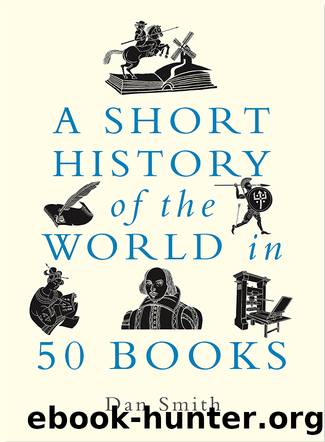A Short History of the World in 50 Books by Daniel Smith

Author:Daniel Smith [Smith, Daniel]
Language: eng
Format: epub
ISBN: 9781789294088
Google: wWyQzgEACAAJ
Publisher: MikeO'Mara
Published: 2022-07-21T20:44:23+00:00
Shakespeare also had the good fortune to write in the language that over the next few centuries would become the lingua franca for vast swathes of the planet, ensuring his work spread across the globe. But why did Shakespeareâs name become supreme so widely, and not that of some other writer? Part of the answer is surely his preternatural ability to address themes of universality â love and hate, war, peace and power, freedom, revenge, greed, lust and more. Nelson Mandela, a man whose life seemingly had little in common with that of Shakespeare, was moved to observe: âShakespeare always seems to have something to say to us.â Ben Jonson, one of the writerâs Elizabethan contemporaries, memorably described him as ânot of an age, but for all timeâ. His plays transcend time and place in a unique way. He himself seems to have had in mind that he was communicating to humanity in its entirety, his Globe Theatre bearing the motto âTotus mundus agit histrionemâ (âThe entire world is a playhouseâ).
In his characterization and plotting, Shakespeare explored archetypes, touchstone figures and ideas recognizable from theatrical tradition. But he added a layer of psychological complexity that pushed the expectations of what drama and literature can achieve. His archetypes became fully formed humans, imbued with the full gamut of emotions, strengths and frailties â all communicated in the most memorable of language. Has there ever been a more complete study of a man in crisis, for instance, than that of Hamlet? Or a single more memorable exploration of the human psyche than his âTo be or not to beâ soliloquy? If one thinks of the defining narrative of doomed love, who â even today â need look further than Romeo and Juliet? If one is accusing another of treachery, still they are likely to reach for the words of Julius Caesar: âEt tu, Brute?â For evidence of his brilliance as a purveyor of psychological depth, study the works of Sigmund Freud, written several centuries later. Freud littered his writings with quotations from the playwright, whom he described as âthe greatest of poetsâ.
Download
This site does not store any files on its server. We only index and link to content provided by other sites. Please contact the content providers to delete copyright contents if any and email us, we'll remove relevant links or contents immediately.
| Booksellers & Bookselling | General |
| History of Books |
4 3 2 1: A Novel by Paul Auster(12372)
The handmaid's tale by Margaret Atwood(7757)
Giovanni's Room by James Baldwin(7325)
Asking the Right Questions: A Guide to Critical Thinking by M. Neil Browne & Stuart M. Keeley(5757)
Big Magic: Creative Living Beyond Fear by Elizabeth Gilbert(5754)
Ego Is the Enemy by Ryan Holiday(5413)
The Body: A Guide for Occupants by Bill Bryson(5080)
On Writing A Memoir of the Craft by Stephen King(4935)
Ken Follett - World without end by Ken Follett(4723)
Adulting by Kelly Williams Brown(4565)
Bluets by Maggie Nelson(4547)
Eat That Frog! by Brian Tracy(4525)
Guilty Pleasures by Laurell K Hamilton(4439)
The Poetry of Pablo Neruda by Pablo Neruda(4097)
Alive: The Story of the Andes Survivors by Piers Paul Read(4018)
White Noise - A Novel by Don DeLillo(4002)
Fingerprints of the Gods by Graham Hancock(3995)
The Book of Joy by Dalai Lama(3976)
The Bookshop by Penelope Fitzgerald(3844)
